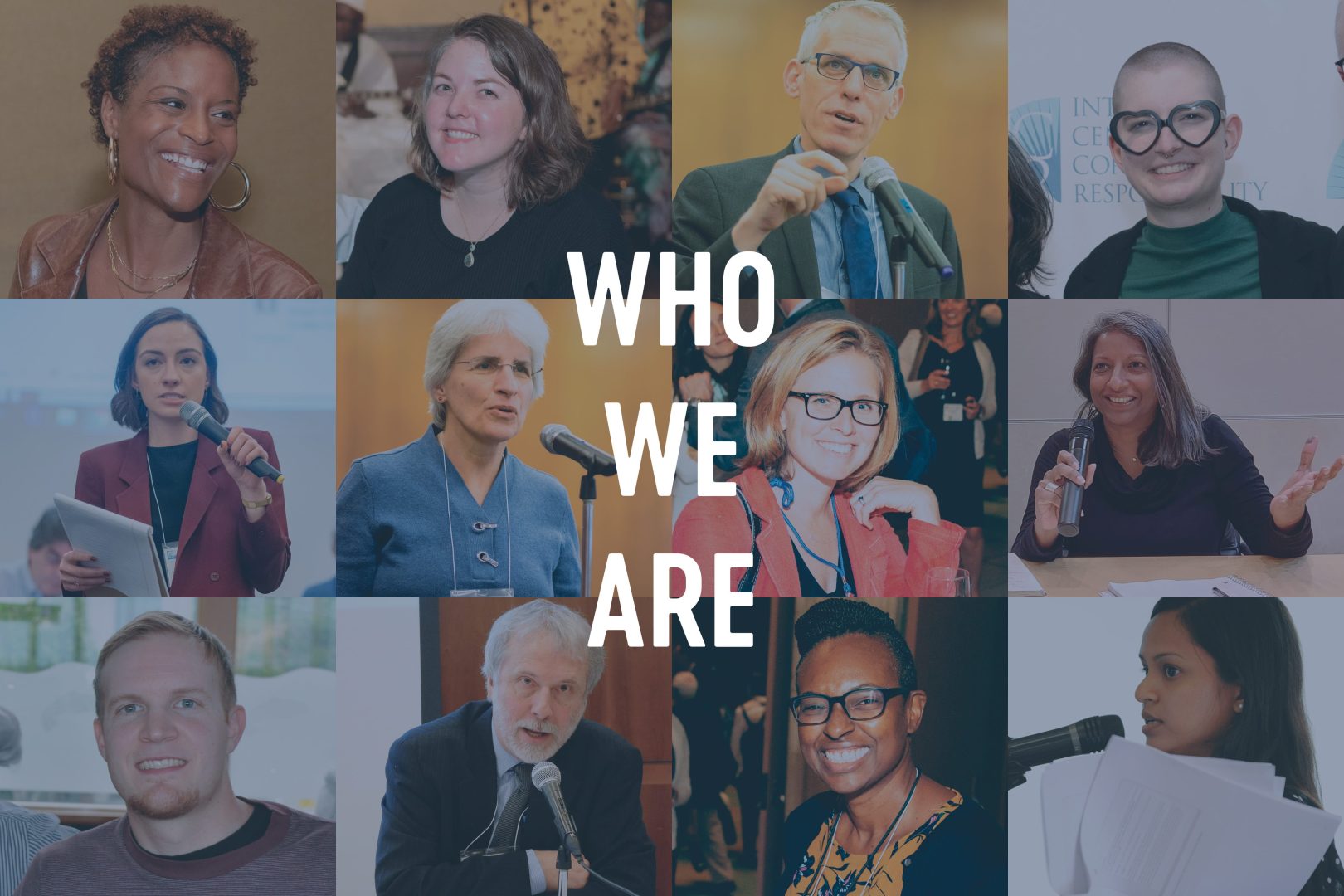Corporate Support for Trump’s Zero Tolerance Immigration Policy Prompts Shareholder Resolutions in 2019
On International Migrant’s Day, multiple companies with contracts related to the identification and detention of migrants cited by shareholders for human rights risks.
NEW YORK, NY, TUESDAY, DECEMBER 18TH, 2018 – Today, members of the Interfaith Center on Corporate Responsibility announced a group of six shareholder resolutions filed at companies across the private prison, technology, banking and defense sectors deemed at risk for human rights violations as a result of government contracts that support President Trump’s “zero-tolerance” immigration policy.
The current “zero-tolerance” immigration policy has become one of the most high-profile and contentious human rights issues facing the U.S. As a result of the Trump Administration’s adoption of a more aggressive approach to restricting immigration, arrests by Immigration and Customs Enforcement (ICE) rose 11% during 2018. The resulting detention of undocumented immigrants and asylum-seekers, especially the separation of minor children from parents entering the U.S., has spurred widespread debate regarding potential human and civil rights violations.
As of September 2018, 12,800 children had been detained, a massive increase from the 2,400 detained as of May 2017. Government agencies have begun contracting with technology and consulting companies for products and services that may enable increased targeted surveillance of immigrant communities, presenting risks to privacy and freedom of expression.
While the six proposals below are being filed for the 2019 proxy season, ICCR members are conducting engagements with additional companies on similar issues, many of them amid growing pressure from both employees and consumer groups.
Private Prisons
- CoreCivic (allegations of forced labor and failure to provide medical assistance to detainees)
- GEO Group (issues relating to safety, detainee rights, and medical care)
Technology
- Amazon (sale of facial recognition technology to government agencies including ICE and state law enforcement)
Financial Services
- SunTrust (funding for MVM, Inc. and Comprehensive Health Services, which are directly contracted with U.S. government agencies carrying out the “zero tolerance” immigration policy
- Wells Fargo (providing revolving credit and term loans to GEO; letters of credit on CoreCivic’s behalf; and underwriting bonds for both GEO and CoreCivic)
Defense Contractor
- Northrop Grumman (racial bias, privacy and surveillance via Homeland Advanced Recognition Technology (HART) database developed for the Department of Homeland Security)
All the resolutions cite concerns over potential human rights violations as set forth by the UN Guiding Principles on Business and Human Rights (UNGPs). The UNGPs articulate the corporate responsibility to respect human rights and provide remedy to victims of corporate-related abuses regardless of whether or not the state upholds its duty to protect human rights. The investors argue that human rights risks related to the “zero tolerance” policy are both serious and material and are calling for increased due diligence to assess and address real and potential human rights impacts they may be contributing or directly linked to, through U.S. federal government contracts.
For-profit private prisons engaged in immigrant detention, including of families with children, across the country, are perhaps most directly linked to actual or potential human rights impacts.
“The Department of Homeland Security’s Office of Inspector General in October 2018 reported ‘serious issues relating to safety, detainee rights, and medical care’ at a GEO-owned and operated immigration detention center in Adelanto, California,” said Rev. Bryan Pham, S.J., of the Jesuits USA West Province, which led the filing at GEO. “Inspectors found nooses made from twisted bed sheets in 15 of 20 cells inspected, despite 1 suicide and 7 attempts at the facility last year. Our resolution seeks to learn how GEO ensures that its employees are aware of, and know how to apply, the company’s commitment to inmate/detainee human rights and how to remedy any shortcomings in human rights performance.”
Technology companies with active contracts with federal immigration agencies that provide a range of hardware and other infrastructure including cloud services, biometric and facial recognition technology, recruitment, case management and network operations management are also considered at risk by investors.
“Amazon Web Services provides cloud computing services to Immigration and Customs Enforcement (ICE) and is reportedly marketing Rekognition to ICE, despite concerns Rekognition could facilitate increased immigrant surveillance and racial profiling,” said Mary Beth Gallagher of the Tri-State Coalition for Responsible Investment, who led the filing at Amazon. “Our resolution requests that Amazon prohibit sales of facial recognition technology to government agencies unless it concludes, after an evaluation using independent evidence, that the technology does not materially violate civil and human rights.”
Dialogues are also being held on immigration themes with Microsoft and Accenture.
In February 2018, defense contractor Northrop Grumman was awarded a $95 million contract with the Department of Homeland Security’s (DHS) Office of Biometric Identity Management to develop technology for the Homeland Advanced Recognition Technology (HART) database. This database will expand the capacity of DHS to collect, store, and share biometric data, such as facial images, fingerprints, iris images, and voice, as well as biographical data, including personal identification numbers, citizenship status, and nationality.
Said Sr. Nora Nash of the Sisters of St. Francis of Philadelphia, lead filer of the resolution along with the Tri-State Coalition for Responsible Investment, “The HART database will amplify the surveillance capabilities of government agencies, presenting risks to privacy and First Amendment rights and causing harm to immigrant communities. There are concerns that the algorithms used to identify facial images that may be stored in the database have inherent racial bias. Through the provision of services through the DHS contract, Northrop Grumman may be linked or contribute to these adverse human rights impacts.”
General Dynamics is also being engaged on immigration by ICCR members.
Financial institutions which provide access to capital and financial support to industries must implement robust human rights due diligence processes to ensure that they do not contribute to human rights violations or become directly linked to violations through their business relationships with the U.S. government.
“Wells Fargo Corporation (WFC) has come under fire for its relationships with GEO Group and CoreCivic, private prison companies that contract with ICE and benefit from more aggressive immigration enforcement,” said Edgar Hernandez, Assistant Director, Strategic Initiatives Department, at SEIU. “Our proposal asks WFC to report to shareholders by December 31, 2019 on how WFC is identifying and addressing human rights risks to WFC related to the Trump Administration’s aggressive immigration enforcement policy, which aims to prosecute all persons who enter or attempt to enter the United States, including the detention without parole of asylum-seekers and the separation of minor children from parents accused of entering the U.S. illegally.”
Proposals were also filed by ICCR members at SunTrust Bank, and members are holding dialogues with Bank of America and J.P. Morgan Chase.
Earlier this year, the Investor Alliance for Human Rights, an ICCR initiative, published Guidance on Corporate Human Rights Due Diligence Related to Immigration Detention and Family Separationmeant toprovide an overview of the human rights risks associated with family separation and indefinite immigrant detention, and includes guidance to help companies identify, assess and address those risks, both in the U.S. and globally.
To learn more about this initiative, please visit this link.
About the Interfaith Center on Corporate Responsibility (ICCR)
Celebrating its 48th year, ICCR is the pioneer coalition of shareholder advocates who view the management of their investments as a catalyst for social change. Its 300 member organizations comprise faith communities, socially responsible asset managers, unions, pensions, NGOs and other socially responsible investors with combined assets of over $400 billion. ICCR members engage hundreds of corporations annually in an effort to foster greater corporate accountability. www.iccr.org




